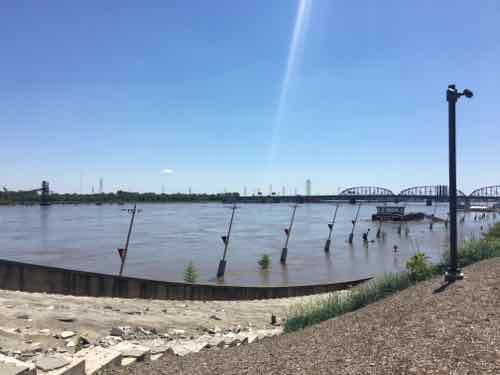Opinion: Recent Flooding An Act of Mankind, Not A Deity
The afternoon of Sunday April 29th I posted a news story to this blog’s Facebook page with a title that read: “MoDot: Very good chance Route 141 at I-44 underwater by Monday morning.” It was. Route 141 didn’t reopen again until late Monday May 8th. When posting the article I’d said: “Sprawl is to blame.”
Two comments stood out:
- Maybe rain is to blame. Not everything needs to be blamed folks.
- Poor design is to blame – how hard is it to to (re) build a road higher than known flood levels?! Higher than the adjacent flood wall?!
These two comments, both from individuals I know personally, demonstrate why the region is in this mess in the first place. The “it rains, it floods” and “just build higher” is exactly why such a major flood happened again so soon after the December 2015 flood. We’ve been building higher which helps some initially — but water must go somewhere. More on this later.
Those who believe in a diety might say something like “It’s all part of his plan.” This is the “I can’t understand it so God must have done it” response.

The phrase “act of God” does have legal meaning:
act of God
n. a natural catastrophe which no one can prevent such as an earthquake, a tidal wave, a volcanic eruption, a hurricane or a tornado. Acts of God are significant for two reasons 1) for the havoc and damage they wreak, and 2) because often contracts state that “acts of God” are an excuse for delay or failure to fulfill a commitment or to complete a construction project. Many insurance policies exempt coverage for damage caused by acts of God, which is one time an insurance company gets religion. At times disputes arise as to whether a violent storm or other disaster was an act of God (and therefore exempt from a claim) or a foreseeable natural event. God knows the answer! (Law.com)
Note that flooding isn’t in the above definition. To be fair, other definitions do include flooding. As an atheist, I prefer the term, “act of nature.” But our recent flooding was neither — it was manmade.
“Land use is really a huge factor in flooding,” Holmes said. “From what I’ve seen, it trumps climate change in some areas.”
It’s definitely “a bigger game-changer,” he says, in urban areas, where paved surfaces drive more runoff into waterways and still more water is diverted by levee systems.
Bob Criss, a professor at Washington University’s Department of Earth and Planetary Sciences who studies flooding, agrees that the cumulative impact of diverted water — and not rainfall — best explains the region’s recent major floods.
The problem, he says, was especially apparent with last week’s crest of the Mississippi River. Such a big river, he says, should not normally be so sensitive to similar episodes of rain. But he says it’s increasingly behaving like a small basin “because it’s far too squeezed” by levees that amplify flood severity. (Post-Dispatch)
The City of St. Louis divorced itself from the largely rural St. Louis Count in 1876. In the 20th century population began to spread out — consuming more land per person. Just in the nearly 27 years I’ve lived in the region I’ve seen lots of low flood plain get developed.

In the recent non-scientific Sunday Poll most didn’t think flooding was an “Act of God.”
Q: Agree or disagree: Recent flooding in the St. Louis region was an “Act of God.”
- Strongly agree 0 [0%]
- Agree 5 [14.71%]
- Somewhat agree 2 [5.88%]
- Neither agree or disagree 3 [8.82%]
- Somewhat disagree 4 [11.76%]
- Disagree 3 [8.82%]
- Strongly disagree 16 [47.06%]
- Unsure/No Answer 1 [2.94%]
Flooding throughout the region will continue until we take the necessary steps to undo the causes. This means we must remove considerable non-poutous paving, and un-develop flood plains. This line of thought led me to again watch Ellen Dunham-Jones’s 2010 TED Talk on Retrofitting Suburbia.
At the 16 minute mark she talks about regreening parts of Atlanta — pulling development back from waterways. The St. Louis region desperately needs to do this. I doubt anything like this will take place, regular flooding will continue.
— Steve Patterson